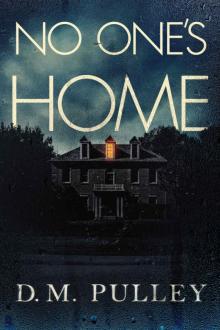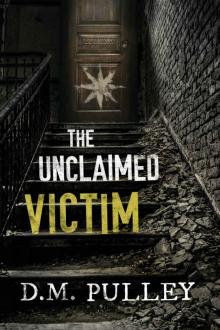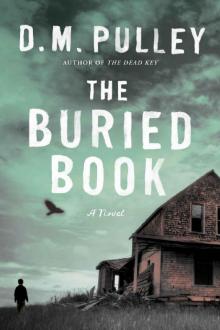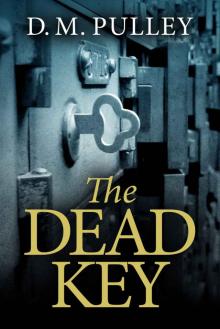- Home
- D. M. Pulley
The Unclaimed Victim Page 10
The Unclaimed Victim Read online
Page 10
Kris bit her lip. Four of those books were sitting in her backpack on the backseat of her Jeep. “Was anyone in here lately to read them?”
She nodded. “That’s why the files are out. A gentleman came in the other day to look through the coroner’s reports and several other things. We left it all there for him because he said he planned to come back. They’ve been sitting there for over a week.”
“Did he give you a name?”
“Yes, he did. Now what was it? Something common like John or James. You’ll have to forgive me, I’m terrible with names.”
“What did he look like?”
“I don’t quite remember. He was older. Tall. He had a nice suit, but he wasn’t too friendly, now that I think about it. Help yourself. I’m about ready to file all that away again. I don’t think he’s coming back.”
Kris was only half listening as she walked over to the table and sat down. She pulled open the file box to find a loose collection of handwritten notes on standard forms. The tight, narrow cursive lettering had been smudged and the white paper smeared with a million fingerprints.
The tweedy woman appeared behind her with a pair of thin white gloves loosely sewn and clearly disposable. “You can see why we ask you to wear these.”
Kris nodded and pulled on the ill-fitting hand socks. She waited until the librarian had gone back to her desk, then squinted to decipher the smeared ink.
Body found at mouth of sewer outlet.
No sign of skin abr—ions.
Multiple hesitation marks, inconsistent with pr—s victims . . .
The date for the medical examination was listed as April something, 1938. Kris squinted to make out any other details. She remembered from her reading that the first Torso victim was found in 1934, so she flipped through the pages in the file to find it. There was nothing there dated before 1937. She opened a second cardboard file holder marked Suspected Torso Victims and found a thick pile of records dated between 1939 and 1941. They were all for murders that were later ruled out as potential Torso victims for one reason or another.
Decapitation too crude.
Inconsistent disarticulation of the limbs.
Crime of passion.
Gangland hit.
Kris leafed through one dead end after another, and there was still no sign of the earlier murder victims. No sign of Flo Polillo or Edward Andrassy or the unidentified young vagrant the books and discussion boards called the Tattooed Man.
“Excuse me,” Kris said, scanning the table for another box or two. “Is this all of the coroner’s files?”
The librarian looked up from her pile of paper. “That’s everything we have for the Torso Murders.”
“But some of the files are missing.” Kris leafed through the stack of papers dated 1937 and 1938. All of them were nearly illegible and at most covered only three of the thirteen victims.
The young woman gave her a pained smile. “I’m afraid documents related to that case have a tendency to walk away.”
“You mean people steal them? But why?”
“Hobbyists take them. Collectors buy them, I guess. I don’t really know. I’ve heard there’s a whole cottage industry around the buying and selling of murder memorabilia.”
“But . . .” Kris gaped at the worn papers. “Isn’t that illegal? Stealing from the archives?”
The woman shrugged. “I suppose it is, but the Cleveland police don’t really have the time to deal with it, and we’re not staffed here for security. There’s just three of us most days.”
“Aren’t the files digitized somewhere?”
The woman shook her head and laughed. “We have over three million documents under this roof. The county just approved funds to scan five percent of them, and even that’s going to take us several years. I’m sorry, but welcome to the archives.”
“What about the man that was here the other day? Did he take something?”
The thin face of the woman pinched into a frown. “Goodness, I hope not, but I can’t say for sure . . . He was here for hours, and I’m sure there were times he would’ve had the chance. We provide access to the photocopier for free for just this reason, but people will do what they will.”
She stood up to look over Kris’s shoulder at the papers still left in the file.
Kris watched the woman carefully leaf through the pages while her head raced with questions. Had her father come all the way to Cleveland to search the records himself? Had he found something?
“You know, it does seem a few papers short. I wish I could tell you for sure.” The librarian puckered her lips around an imagined lemon as she strained to remember. “If you want to know more about the murders, go visit the Cleveland Press archives over at Cleveland State. They should have all the newspaper clippings from back then.”
It was her cue to leave. Kris stood up and headed to the door, but her feet stopped halfway there. She pulled her father’s driver’s license from her pocket. “Excuse me? I’m sorry, but can I ask you one more question?”
The woman looked up from her filing with raised eyebrows.
Kris set the ID down on the woman’s desk. “Do you recognize this man? Has he been here before?”
She picked up the license and studied his face. “That’s him. He’s the one that asked for the files.”
“It is?” A chorus sang in her ears. “When was he here?”
“Oh. At least a week ago. Maybe two?” The clerk didn’t notice the blood drain from Kris’s face as her hopes went silent.
He’d been there and she hadn’t even known. He’d been there looking for a killer.
CHAPTER 14
Kris stepped off the elevator in CSU’s Rhodes Tower and pushed herself through the door marked Special Collections. The enormous room housed its own library in a humidity-controlled chill. Floor-to-ceiling shelves stuffed with metal shoeboxes lined the two walls to her left. Microfilm readers and computers lined two tables to her right, and the center was a maze of bookshelves and microfilm storages.
The only other person in the room looked up from behind her computer in the center. “Can I help you?”
“Uh, I’m not sure.” Kris bit her lip and stifled a shiver. She’d passed the building where her art history professor was giving a lecture at that very moment. That’s where she should’ve been that morning. “I’m looking for information about the Torso Murders?”
The woman’s plump cheeks dimpled with an apologetic smile. “Good luck finding anything.”
Kris frowned. “What do you mean?”
“All of the Cleveland Press clippings on the Torso Killer walked off years ago. Half of them never even made it into the archive in the first place.” The woman noticed the confused look on Kris’s face and explained, “Staffers at the Press got wind of the paper’s shutdown and made off with anything they could sell. Photos of the Beatles. Clippings from the first Ramones concert. Torso Murder photos. You name it. You’re not the first one to come looking, and I know for a fact those clippings were picked clean.”
“This is crazy. Aren’t there any records left on these murders?”
“You could try the microfilm.” The woman’s heavy arm gestured toward an enormous wood flat file.
Kris walked over and opened a drawer. It was full of identical cardboard boxes, each the size of a Rubik’s Cube. She picked one up marked May 1934.
The large woman followed her over and tapped on a box in the drawer. “It might take you a while. There’s no index to these. You’ll just have to read through each daily paper, unless you have a specific date you’re looking for . . . It might be easier to search the Plain Dealer records. You can access their database through CLEVNET at the public library.”
“I might be able to come up with a date. Here.” Kris pulled out James Badal’s book and flipped through the pages until she found it. Victim 0—the Lady of the Lake. “Let’s try September 5, 1934.”
The woman ran an orange-painted fingertip over the boxes until it stopped on Septem
ber. She pulled the box out from its place. “That’s strange.” She frowned, shaking it. She popped the lid open, and the box was empty.
The librarian pulled the drawer out as far as it would go and began shoving boxes back and forth, searching for the lost film. Kris watched as the nagging feeling that it wasn’t a coincidence strummed her nerves. She flipped through the pages of the book in her hand until she found the next victim.
“What about September 23, 1935?” she asked in a small voice.
“Hmm?” The librarian, in her frenzy to find the film, seemed to have forgotten she was standing there.
“September 23, 1935. It’s when the next two victims were found.”
The woman pushed the drawer shut and pulled open the one beneath it, scanning the labels until she’d found the right one. She lifted the box marked September 1935 out and her face dropped even further. “I’ll be damned.”
“Someone took it,” Kris whispered.
The librarian slowly shook her head, her chin trembling. “I can’t believe this. People just have absolutely no respect at all. Those films were irreplaceable!”
There were over fifty drawers, each one filled with microfilm, and Kris was willing to bet at least ten more were missing. “I’m so sorry. I had no idea. I just . . . I’m gonna go. I’ll check out the county library like you said . . . I have to go there anyway. Thanks. I mean, thank you for your time.”
Kris scuttled out of special collections, leaving the poor woman gaping into an open drawer. She hauled her backpack onto her shoulder and took the stairs two at a time down the tower and out into the crisp morning sun.
During the entire fifteen-minute walk from Rhodes Tower up to the public library on Superior Avenue, Kris turned it all over in her mind. Someone was systematically removing all record of the Torso Murders from the archives. Why?
The computers at the county library were no help at all. Kris sat down at a terminal and logged in only to find that the Plain Dealer archives were still in the process of being digitized. Whole decades hadn’t been uploaded to the system yet, and the records were currently off-site, being scanned. She typed in the key words Torso, Andrassy, Polillo, Dolezal and got nothing but a blinking cursor.
Defeated, she decided to renew her father’s books, wondering if they might be the only surviving records of the crimes. The line at the checkout counter took nearly ten minutes to wade through. When she finally reached one of the clerks, Kris dumped all four books onto the counter in a heap.
“You don’t have to wait in line for returns. Just shove ’em down the chute.” The woman behind the counter pointed to the silver slot on the opposite wall.
“No. I, uh, I wanted to renew them. Or rather, I’m renewing them for my dad. He’s . . . he’s not feelin’ well and couldn’t make the trip.” Kris pressed her lips into what she hoped looked like a smile.
The woman rolled her eyes ever so slightly, clearly annoyed. Her name tag read, Simone. “You got his library card?”
“No, I—”
“No library card, no service,” Simone interrupted. “There’s nothin’ I can do. Why don’t you just go return the books, and when he’s well, he can come back and get ’em.”
“He can’t. I don’t know when he’ll be able to . . . Look, he needs these books.”
Simone was already looking past Kris to the next customer. “All’s you can do is bring in his library card, ma’am. Next!”
“No. Not next.” Kris glanced back at the woman behind her in line and pleaded, “I’m sorry. I just need a minute. Listen, I really would appreciate your help. I don’t have his library card, but could you look him up in the system? Please . . . Alfred Wiley. Here. I have his driver’s license.”
The look of utter desperation on Kris’s face must’ve struck a nerve somewhere inside the clerk’s heart. Simone took the driver’s license from Kris and slapped it down on the counter next to her computer and started typing. “We don’t usually do this,” she muttered, shaking her head, and then announced to the growing line, “I’m sorry for the delay, folks. This will take just a minute.”
“Thank you, Simone.” Kris wiped away a tear she hadn’t even felt escape. They were just leaking out now for no reason, it seemed. “It means a lot to me.”
Simone stopped typing, picked up a book, and scanned it into the system. After a minute, she picked up the driver’s license and checked it again. “Huh. Your pops move recently?”
Kris blinked at her. “Uh. No.”
“These are checked out under a different address, so I can’t renew these. Besides . . .” The woman handed Kris her father’s driver’s license back and dropped her voice so Kris would lean in. “You need to tell your daddy or whoever that these books is three years overdue. That’s a fine of over a hundred dollars . . . You hear what I’m sayin’? Don’t mean nothin’ to me, but I’d just drop ’em in a box if I was you. Or just don’t come back.”
Kris nodded and picked the books back up again, eying the security guard in the corner. “Thanks. I understand. But could you . . . could you tell me what address was used?”
Simone gave her a hard look, as if weighing her need, then pressed a button on her keyboard and grabbed a piece of paper from the printer behind her. “Here. We gonna forget we ever discussed this, alright?” She handed Kris the sheet and then said loudly, “You enjoy those books now. Next!”
Kris stepped away from the counter with the slip of paper in her hands. She waited until she was past the security guard and out into the street to read the computer-printed profile.
Alfred Wiley
Harmony Mission Press Building
710 Jefferson Avenue
Cleveland, OH 44113
CHAPTER 15
The abandoned Harmony Mission Press complex sprawled over an entire city block. It wasn’t just one building but fifteen slammed together at odd angles as though the builder had suffered a schizophrenic fit during construction. French baroque met medieval Gothic and art deco in a crash of building styles and materials. Brick, stone, and peeling wood siding spread out in discreet wings over a fenced-in courtyard. The grounds were littered with garbage and cigarette butts. Shadows lurked behind the stone and brick arches of the tiered balconies overhead.
Her father might be hiding somewhere inside the empty complex, according to the thin computer printout in her hand. Kris read the address again and shivered. The house she rented sat farther down the block, directly across the street from the loading docks of the old factory. Has he been across the street this entire time? Watching me?
Kris stuffed the paper back into one of her father’s stolen library books. He’d checked them out three years ago. Long before she lived across the street from the old factory. Long before she’d even dreamed of moving to Cleveland. The headless corpse on the cover of the book told her nothing, except that her father was obsessed with a killer. A killer who would be elderly by then, if not dead himself. A killer no one cared about anymore . . . except her father apparently. And David Hohman. And all the other wackos in the Torso Killer chat room. And whoever was stealing from the archives.
A falling-down shack sat in the middle of the gravel courtyard across from the corner of Jefferson and Thurman where she stood. The windows of the place hung crooked and cracked, with faded curtains blocking the view. A portion of the roof had caved in. A plank of loose siding hung from a bent nail.
“Hello?” she called at the little building that must’ve been a caretaker’s house years ago. She picked up a golf ball of a rock and pelted it at the siding. Thunk. “Hello?”
There was no answer or sign of movement. The multistory factory loomed darkly at its back. Kris gauged the height of the pointed iron fence that lined the lot, scanning the length for gaps, debating whether she should climb it.
She headed down Thurman to the loading dock. “Hello?” she called into the cavern. “Anybody home?”
No one answered. The enormous gate was chained shut.
Kris roun
ded the corner and headed down College Avenue to West 7th Street. The brick face of the factory presented a more unified front to this side of the block. The building was several stories taller there as well. The words Harmony Press had been carved into the stone arch above the first doorway where another iron gate blocked her way. She kept walking past the building, its empty windows set high above the sidewalk so that she couldn’t see inside.
Farther up the block, an iron gate hung open. She stopped in front of it and peered into the dark, narrow corridor and back out again. Up and down the street, cars began their slow crawl back home at the end of the workday. The sun had dipped below the rooftops of the houses lining the other side of West 7th. A few straggling residents made their way along the sidewalk to their vehicles or their apartments. The temperature dropped as she stood there debating the wisdom of stepping inside the empty building alone. At night.
Shit. A few scattered snowflakes began to fall.
“Hey there,” a voice said.
She jumped at the sound and turned to see a young guy heading toward her. He was holding a grocery bag. Dreadlocks hung down past his shoulders, and his smile shone brilliant white against his dark tan skin. “Uh, hi.”
“What are you doin’ out here all alone, girl?” He winked at her. His eyes were warm and friendly as she searched them for bad intentions. He looked to be about twenty, twenty-five tops. From the backpack on his shoulder and the Rasta knit cap on his head, she guessed he was a student.
She forced out an awkward laugh. “Nothing really. I’m just looking for someone.”
“Here?” He lifted his eyebrows and motioned toward the open gate.
“I’m not sure. Maybe. It’s . . . it’s kind of a long story.”
“I’d love to hear it. Wanna come in?”
It was Kris’s turn to raise her eyebrows. “In there? Is that . . . where you’re going?”
“Yup. Havin’ a little party. You should come.”
Kris eyed the bag in his hand and then glanced down the dark, chilly corridor again. “You live in there?”

 No One's Home
No One's Home The Unclaimed Victim
The Unclaimed Victim The Buried Book
The Buried Book The Dead Key
The Dead Key